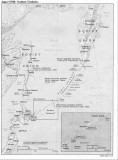List of author's articles

Russian-Japanese relations after World War II
The diploma thesis is devoted to Russian-Japanese relations throughout their duration with emphasis on the period after World War II and the issue of the Kuril Islands. Both countries underwent major changes in the twentieth century. Japan, an aggressive and militaristic state in the 1930s, gained vast territory after World War II. After the defeat in 1945, it was occupied by the occupying troops, which took all power. In the second half of the twentieth century, it benefited from a strategically advantageous position in Asia and from the position of a major US ally in the bipolar world. It developed rapidly economically and in the 1960s became one of the strongest economies in the world. However, to a certain extent, it still bears the stigma of a war-torn state responsible for war, which prevents it from balancing its political influence on the economic level.
🕔︎ 09.07.2010
👁︎ 15.143

Russian-Japanese relations after World War II: 1. Prehistory of Russian-Japanese relations
Russian-Japanese relations date back to the seventeenth century, when Russian colonization began in Siberia. At the turn of the 1930s and 1940s, Russian Cossacks reached the shores of the Sea of Okhotsk and began exploring the Amur and Sakhalin rivers. However, their ambitions were cut short by the expansion of China, which, under the rule of the Manchurian tribes, merged into a strong state, lasting until 1911.
🕔︎ 09.07.2010
👁︎ 20.254

Russian-Japanese relations after World War II: 2. Interwar period
The Portsmouth Agreement remained unchanged until the end of World War II, however, during the Russian Civil War after the October Revolution and in the first half of the 1920s, Japan took advantage of the turmoil and occupied Soviet territories in the Far East. After the Great October Revolution, Japanese troops participated in international intervention in the Russian Far East and, together with other Allied troops, reached Baikal.
🕔︎ 09.07.2010
👁︎ 23.494

Russian-Japanese relations after World War II: 3. Development of relations after the war
Japan, which acted as an aggressor in World War II, was defeated by the Allies. As early as 1943, it was decided that Japan would have to pay reparations and repair war damage. After the war in Japan, the occupying administration of American troops ruled, which tried to turn Japan into a democratic state and its stronghold in Asia.
🕔︎ 09.07.2010
👁︎ 25.624

Russian-Japanese relations after World War II: 4. Russian-Japanese relations at the turn of the millennium
At the end of 1999, Yeltsin resigned and appointed Vladimir Putin as his successor. At first it seemed that Putin would continue the policy of his predecessor, he himself expressed his willingness to conclude a peace treaty at the promised time. On March 26, 2000, Putin was elected the new Russian president, and in September 2000, he paid an official visit to Japan. During talks with Japanese Prime Minister Yoshir Mori, the two leaders agreed that the peace treaty would not be signed by the end of 2000 and that their mutual relations had fallen into disrepair.
🕔︎ 09.07.2010
👁︎ 14.405

Russian-Japanese relations after World War II: 5. Kuril Islands
The first question to be answered in connection with the statute of the Kuril Islands is which of the two nations settled here first. The answer is certainly not uninteresting, although it is not very relevant for determining who the islands should belong to today.
🕔︎ 09.07.2010
👁︎ 33.274

Russian-Japanese relations after World War II: 6. Current relations
Japan and Russia have many reasons for cooperation, both in the political field and in the economic field. Russia has long since ceased to be as strong and influential as it would be, while Japan has relatively little political weight in relation to its economic power. Both countries would therefore like to increase their influence in world politics, but on the Asian continent itself, they are growing strong competition in the form of China. China's growing position can be expected in the future, and it is in Russia's and Japan's interest to work together to balance its influence and prevent it from gaining the status of Asian hegemon.
🕔︎ 09.07.2010
👁︎ 17.671

Russian-Japanese relations after World War II: Appendices
Russian-Japanese relations after World War II
🕔︎ 09.07.2010
👁︎ 14.757

Russian-Japanese relations after World War II: Conclusion
From the outset, relations between Russia and Japan have been accompanied by ambiguities about common borders. These then changed several times throughout history, the results of the Second World War were definitively defined. However, the post-war international situation brought speculation to this arrangement, originally agreed by the victorious participants in the war.
🕔︎ 09.07.2010
👁︎ 15.299

Russian-Japanese relations after World War II: Introduction
The diploma thesis is devoted to Russian-Japanese relations throughout their duration with emphasis on the period after World War II and the issue of the Kuril Islands. Both countries underwent major changes in the twentieth century. Japan, an aggressive and militaristic state in the 1930s, gained vast territory after World War II. After the defeat in 1945, it was occupied by the occupying troops, which took all power. In the second half of the twentieth century, it benefited from a strategically advantageous position in Asia and from the position of a major US ally in the bipolar world. It developed rapidly economically and in the 1960s became one of the strongest economies in the world. However, to a certain extent, it still bears the stigma of a war-torn state responsible for war, which prevents it from balancing its political influence on the economic level.
🕔︎ 09.07.2010
👁︎ 20.844

Russian-Japanese relations after World War II: References
Russian-Japanese relations after World War II
🕔︎ 09.07.2010
👁︎ 11.159
Join us
We believe that there are people with different interests and experiences who could contribute their knowledge and ideas. If you love military history and have experience in historical research, writing articles, editing text, moderating, creating images, graphics or videos, or simply have a desire to contribute to our unique system, you can join us and help us create content that will be interesting and beneficial to other readers.
Find out more